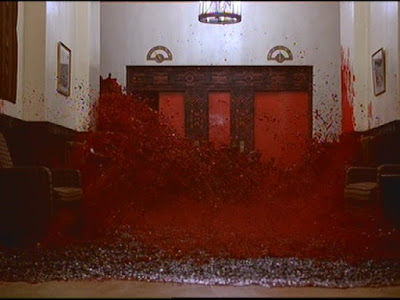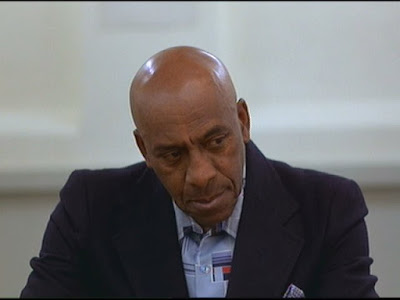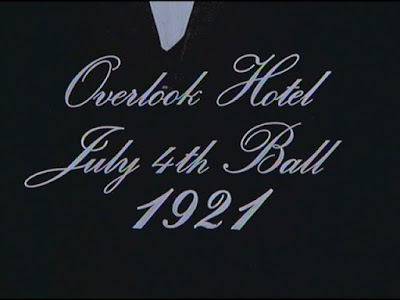Let me repost something from January 2006 as a way of recognizing the 5th anniversary of EBiN.
Local Hero was released in U.S. theaters in February of 1983. Typically, when movie studios open movies in January-March, there's a reason (embarrassment, shame, etc.). But Local Hero is not one of those types of films. It must not have ever found its audience; the soundtrack (by Mark Knopfler of Dire Straits) made more money. That's not saying much, because I think the soundtrack was considered a bit obscure at the time. Viewing it as an adult, it now reminds me of when I first discovered it at the age of 16, which in turn, now reminds me of the place where I grew up.

"Freeway Flyer"
Peter Riegert (Boon from Animal House) plays Mac, a small fish trying to make it in a big pond. He works for Knox Oil & Gas, located in Houston, Texas. His is the fast-paced life of a suit climbing the corporate ladder. He's recently divorced, and he has a Porsche he carries a picture of in his wallet. His life is shallow and empty. Empty as a pocket with nothing to lose.

The company wants to purchase several miles of pristine beachfront property near Ferness, Scotland, due to its potential for high-yield oil drilling. Mac is sent to close the deal, because the CEO mistakenly thinks he is Scottish.

Our and Mac's first glimpse of the tiny fishing village about to invaded by the Yankee silver dollar is in the form of a model at Knox's research and development, Scotland branch. The model is small, generic, artificial, nothing like the real thing:


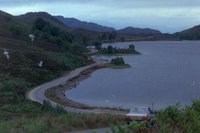

"Wild Theme"

The quiet village has one main road, rarely used by four-wheeled vehicles. Two-wheeled? Well, that's another story.

Mac is sent to negotiate a price for purchase of the entire village from Gordon Urquhart.

The actor might look familiar. It's Denis Lawson, who played Wedge Antilles in Star Wars, The Empire Strikes Back, and Return of the Jedi. He just so happens to also be the uncle of Ewan McGregor.

Mac and his Scottish counterpart might as well be back in the office, walking past endless rows of cubicles. They are inexplicably unaware of the natural beauty surrounding them.
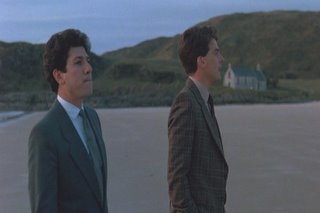
As they discuss all the miracle products oil and petroleum provide mankind, they turn to look at the village and marvel at how similar it is to the model.


Yet, Mac is beginning to fall under its spell.
"The Rocks and the Water"

The village's one phone (don't you love how the advent and proliferation of cell phones has made so many movie and book plot points obsolete?) becomes a vital link back to Houston and "civilization".
Another day at the office.
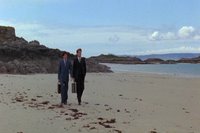

The village seen in the movie was not near the beach that the characters walk on, they were on opposite sides of Scotland. To make the connection, a cardboard church was built at the end of the beach to match the church in the village.

Slowly, but surely, the big city oil men are seduced.

Mac discovers an old hermit, who lives in a ramshackle structure on the beach, owns the entire beach, according to an ancient deed. The man's name is Ben Knox. He could be a major impediment to the deal. Mac and Urquhart must treat him with kid gloves and basically kiss his ass.
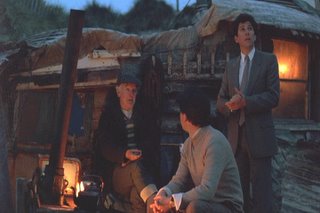
Mac sees his first meteor shower during the initial meeting with the old hermit, Ben.
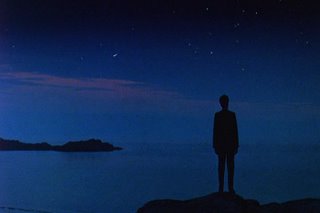
The smallness of man.
As Mac comes increasingly under the area's spell, he begins to shed his corporate uniform, first, losing the sacred symbol of business--the necktie.

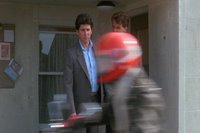





Houston time seems far, far away.

The CEO of Knox Oil & Gas, back in Houston, has asked Mac to keep him advised--not of the deal, but of the skies. You see, the CEO, Happer, is an avid, amateur astronomer.
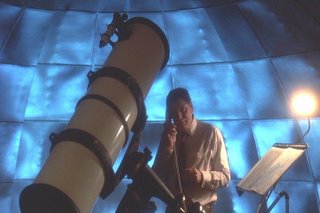
Happer, portrayed by Burt Lancaster, is keen to discover a comet, and to name it Happer's Comet.
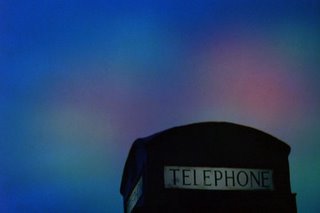
"The Ceilidh and the Northern Lights"

CEO Happer, based on Mac's descriptions of events in the sky, concludes there is something special about Aberdeen. He decides to make a personal appearance.

Happer meets with old hermit Ben, the final barrier to closing the sale of the beach and village. Ben and Happer share a love of astronomy.
The plans for tearing down the village and turning it into an oil refinery change, and now it will become part of a marine life research center. The villagers will still get paid, and yet retain their way of life. CEO Happer sends Mac back to Houston to make the necessary changes. Everyone wins. But why does Mac feel so blue? Has he fallen in love with the place?
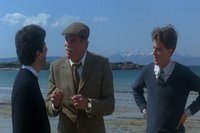




Is it goodbye?.......

Back in Houston, Mac's overcoat pockets are stuffed full of seashells, and they still smell like Ferness.
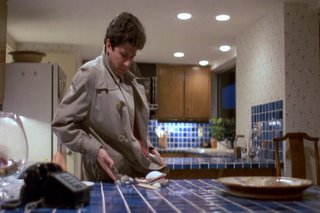

So beautiful:

The pollution, police sirens, traffic sounds, and other noise of Houston (circa 1983) reach the lofty heights of Mac's high-rise condo's balcony.
The film's final shot of the village and the lone phone booth leaves us guessing:





